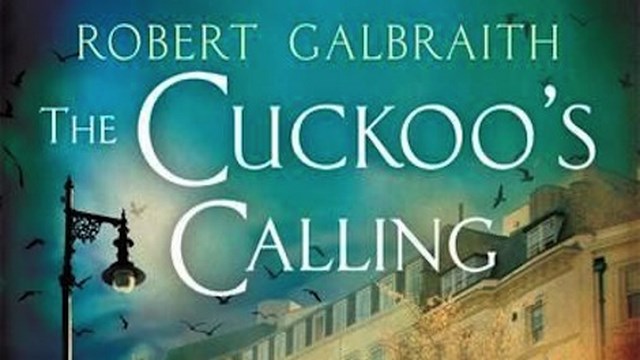| When JK Rowling was outed as the author of The Cuckoo's Calling, she responded just like her new novel's killer. She began with a bit of casual amusement ("I had hoped to keep this secret a little longer") before her mood soured to outright rage ("To say that I am disappointed is an understatement…I feel very angry"). It's hard to blame her. After all, she had drawn up her pseudonymous author, ex-Royal Military Police officer Robert Galbraith, with the precision of the perfect crime. Alas, neither her secret authorship nor the killer remain at large in Rowling's 9th novel, a speedy little murder mystery as quick as it is clever. She abandons the 20-character, 200-page opening slog that began The Casual Vacancy (her last book), as she introduces a dead body on page one and the principal characters by page 10. It's a pleasing adjustment for Rowling, whose tendency to linger on exposition only grew throughout her famous Harry Potter series. A speedy plot still deserves compelling characters, and here, Rowling delivers. Her detective, Cormoran Strike, provides a welcome departure from the Sherlocks and Poirots of classic crime. Lumbering, lovelorn, and a little lazy, Strike's large physical presence and grunting interviews give the book's hero a flash of blue-collar charm. He may be British, but he lacks the intellectual snobbery so standard among literature's most popular private eyes. Better yet, Strike's very own Watson—25-year-old Robin Ellacott—steals the page, her slight frame and polished disposition an amusing complement to her rotund, bumbling superior. With Robin, Rowling attempts to win over old fans: just as the Potter series played up teenaged boarding school blues, The Cuckoo's Calling takes amusing jabs at Robin's post-college search for employment. To (multimillionaire) Rowling's credit, she can still capture the dark humor of joblessness. Of course, one would only expect Rowling to nail her characters; it's her whodunit instincts that have missed nearly as much as they've hit. Her riddles in the Sorceror's Stone--as tidy as a freshly swept porch—proved she could handle the basics. She stumbled with Chamber of Secrets (the big reveal had all the fanfare of a mouse squeak), then produced a few workhorse puzzles in Prisoner of Azkaban and Goblet of Fire (surprise endings with just enough clues not to feel cheap). It wasn't until Half-Blood Prince that she wrote a fully mature mystery, weaving dark pasts, ample clues, and a few proper red herrings into a single novel. Regrettably, she regressed with Deathly Hallows, leaning too heavily on a set of intricate wand-ownership rules that proved far more confusing than clever. As such, I can report—with equal measures enthusiasm and relief—that The Cuckoo's Calling is a fine mystery. The scene of the crime invites a dozen different possibilities. The suspect list hits all the notes you'd hope (the curmudgeon, the estranged friend, the worried sibling, the wily colleague, the man who knows too much, the woman who should know more). The interviews ooze misdirection and a handful of key details seem to defy explanation. After her spotty history, one can't help but feel that Rowling's crime inclinations were there all along, buried beneath a growing catalog of magical rules and sprawling plot lines. Still, there's nothing in The Cuckoo's Calling as diabolical as Agatha Christie's best work, nor as engrossing as anything by Dorothy Sayers. Long-time crime readers will solve the murder well before the novel's conclusion (even if bits and pieces of the method will remain elusive). Rowling has learned the rules of mystery well. Now she must learn to bend and twist them to her will, fooling even her smartest readers by using their crime novel instincts against them. Indeed, the best mysteries are their own kind of magic. | My Harry Potter Ranking7. Deathly Hallows (book 7) Bloated and sometimes boring, Deathly Hallows abandons the comfy confines of Hogwarts School of Witchcraft and Wizardry, dragging readers into abandoned woods and through a convoluted treatise on wand ownership. A disappointing finale. 6. Chamber of Secrets (book 2) A transitionary novel, Rowling seems caught between a kid's book and a young adult novel. A memory from an old diary hits a few intriguing notes early, but Chamber of Secrets ends up the series' most forgettable entry. 5. Sorcerer's Stone (book 1) A fine children's book and witty introduction to the world of Potter, Sorcerer's Stone lacks the depth and challenging themes of the series' subsequent novels. 4. Order of the Phoenix (book 5) The most thematically ambitious of the Potter books, Order of the Phoenix pits Harry and his few allies against a slyly ominous, overreaching government. Only an overly-angsty Harry (Rowling overplays his teenaged moodiness) and an indulgent length (100 pages too long) mars an otherwise excellent entry. 3. Prisoner of Azkaban (book 3) Showcasing the tightest plot of the series, Prisoner of Azkaban is near-perfect in its pacing, all the way through its time-shifting, death-dodging finale. My favorite resolution in the series. 2. Half-Blood Prince (book 6) The most thoughtful of the Potter novels, Half-Blood Prince mesmerizes. With haunting flashbacks, a genuine mystery, and the most tragic moment in the entire series, Rowling displays a storytelling maturity years beyond the uncomplicated whimsy of Sorcerer's Stone. 1. Goblet of Fire (book 4) More fun and more consistently riveting than any other entry, Goblet of Fire's 734 pages read faster than Sorcerer's Stone's 309. An evocative final encounter and stunning reveal push the book just past Half-Blook Prince for the top spot on my list. |
|
521 Comments
|
TheCroakingFrog
|


 RSS Feed
RSS Feed
